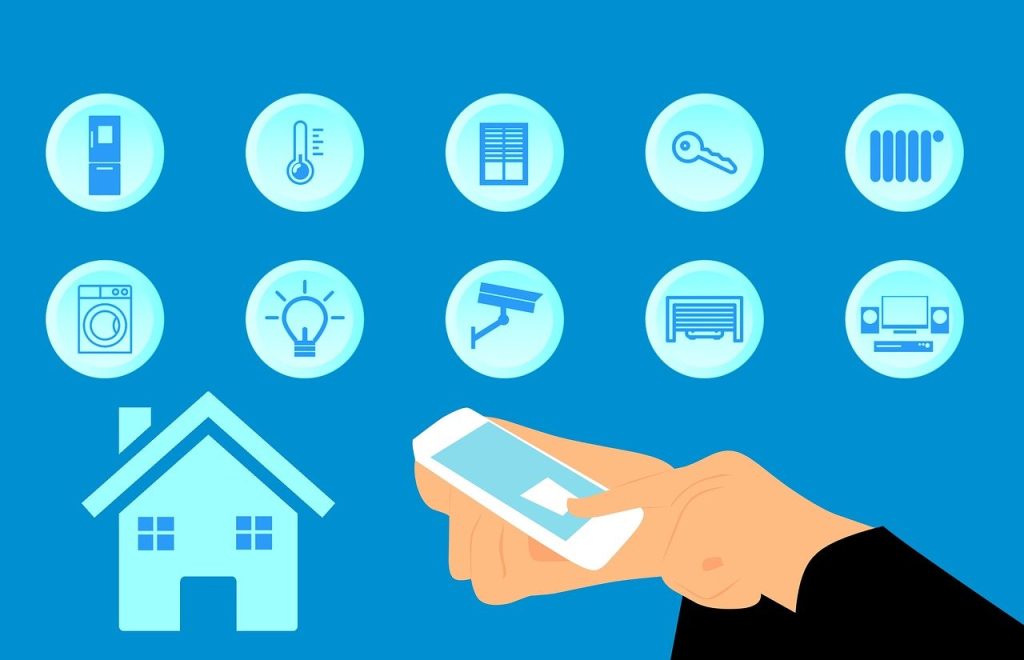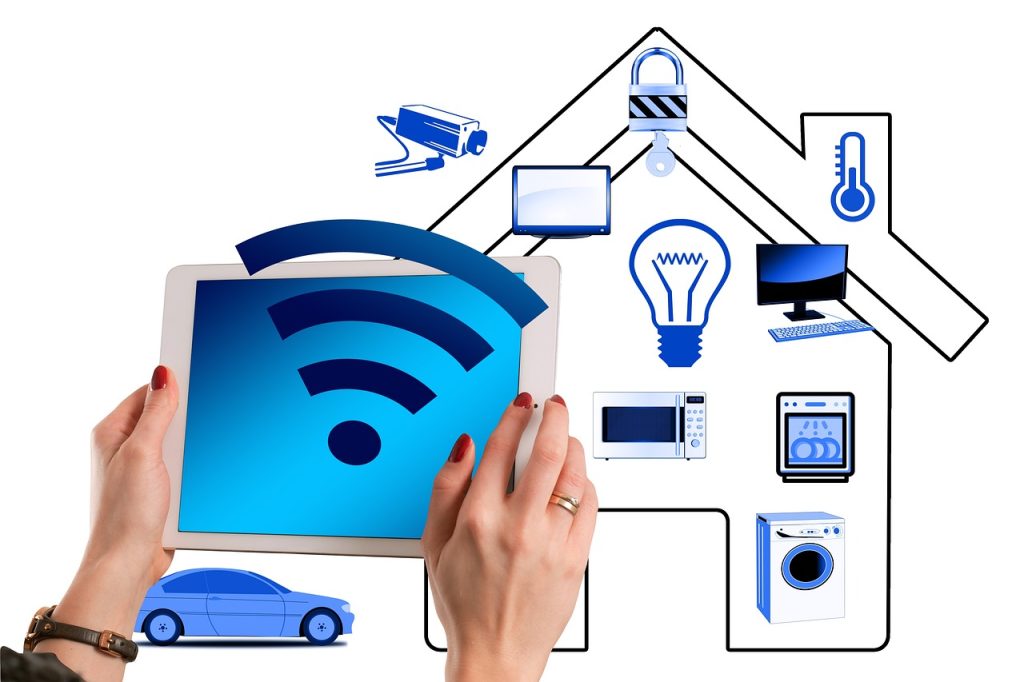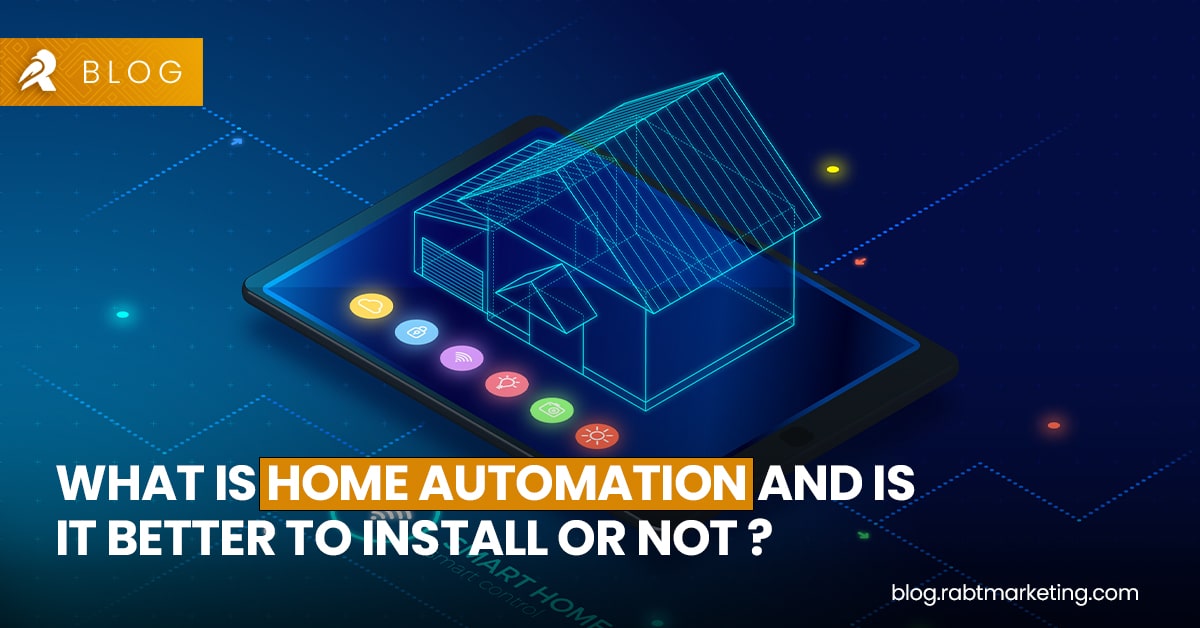Home automation is an advanced technology and an amazing innovation in the world of construction industry. It is often referred to as “smart home technology,” is a revolutionary concept that has transformed the way we interact with our homes and residential spaces. This cutting-edge technology enables the residents to control and monitor various aspects of their homes through the integration of devices and systems, resulting in a more convenient, energy-efficient, and safe and secure environment.
In this blog, we will delve into the world of home automation, exploring its components, benefits, and potential future developments.
The Components of Home Automation

Smart Devices and Appliances Smart devices are at the heart of home automation. These can include smart thermostats, lighting, locks, cameras, and even appliances. They are equipped with connectivity features that enables you to control them remotely via a smartphone, tablet, or computer. For example, a smart thermostat enables you to adjust your home’s temperature while you’re away, saving energy and money.
Hubs and Controllers Hubs and controllers serve as the central command center for your smart home. Popular examples include Amazon Echo, Google Home, and Apple HomeKit. These devices act as a bridge, enabling you to interact with and control all your smart devices from one central place, mostly through voice commands.
Sensors Sensors are one of the most significant parts of components of home automation. They can detect motion, light levels, temperature, humidity, and more. Using this data, automated actions can be initiated, such as turning on lights when a person enters a room or adjusting the thermostat when the temperature changes. Sensors can also be used to monitor and control energy consumption, as well as to monitor the safety of your home.
Voice Assistants There are mostly 3 voice assistants, Alexa, Google Assistant, and Siri. and They work with nearly all Internet of Things (IOT) devices. These voice assistants have become an integral part of home automation. They enable you to control your devices and systems through natural language commands, making interaction more intuitive. You can speak loudly and deliver commands to the system.
Security Systems Home security is a top priority for many homeowners, and home automation has made it easier to monitor and protect your property. Smart cameras, doorbell cameras, and motion detectors can send alerts and footage to your devices, enhancing your peace of mind. Home automation systems can integrate with your home security system, providing a higher level of protection.
More: Top 5 Home Automation Companies in Pakistan
Pros and Cons of Smart Home Technology

Like every other thing, home automation has its own pros and cons. It depends upon the personal interests and preferences of the residents. We discuss a few of the advantages and disadvantages of smart home technology.
Pros
Energy Efficiency Home automation technology is highly energy efficient and it can significantly reduce energy consumption. Smart thermostats learn your heating and cooling patterns and can adjust the temperature to conserve energy. Lighting systems can be programmed to turn off when you leave a room, reducing electricity consumption. These small changes add up over time and lower utility bills.
Convenience One of the most compelling benefits of home automation is the convenience and comfort it provides. With a simple voice command or a tap on your smartphone, you can adjust the lighting, control the temperature, or even make your morning coffee without leaving your bed. This technology simplifies daily tasks and improves your quality of life. Home automation can also help you to lower your utility bills and become more environmentally responsible.
Safety and Security Home automation systems often include robust security features. Smart locks can be remotely controlled and monitored, while smart cameras provide real-time surveillance and alerts. You can check your security cameras and receive alerts on your smartphone, enhancing your home’s security. Sensors can also be used to detect water leaks or the presence of pests.For higher security, sensors can also alert you in the event of an emergency, such as a break-in or a fire. Moreover, they can also be used to detect water leaks or the presence of pests.
Peace of Mind The ability to monitor and control your home remotely provides peace of mind and a sense of satisfaction. Whether you’re at work or on vacation, you can check in on your property, receive notifications about any unusual activities, and take precautionary measures before any bad incident.
Customization Home automation systems are highly customizable, allowing residents to tailor their smart homes according to their specific needs and requirements.You can also control your home remotely, from anywhere with an internet connection. This makes it easy to monitor your home remotely and adjust while you’re away.You can create schedules and scenes that fit your lifestyle and make your home work for you.
Cons
While smart home technology offers numerous benefits, it’s essential to consider some potential drawbacks and challenges associated with home automation. Here are a few cons of smart home building:
Initial Cost: One of the most significant disadvantages of smart home technology is the initial investment. For the long term benefit you have to purchase IoT smart devices.They can be expensive to purchase and install. The cost includes not only the devices themselves but also the infrastructure needed for connectivity.
Complex Installation: Integrating smart devices and systems can be complex and may require professional installation, which can further increase the upfront costs. Setting up a smart home may also involve running wires, configuring hubs, and ensuring compatibility between various devices.
Privacy and Security Concerns: Cyber security and hacking issues can exist in case of installation of home automation technology.Smart devices are vulnerable to hacking and data breaches, potentially exposing your personal information and the security of your home. Manufacturers continually update their devices to address security issues, but vulnerabilities can still exist.
Dependence on Connectivity: Smart homes depend on a reliable internet connection. If your network experiences downtime or interruptions, you may lose control over your smart devices, rendering some functions inaccessible. Hence It is important to ensure that you have a reliable and secure internet connection to keep your smart home secure.
Compatibility Issues: Not all smart devices work seamlessly together, and compatibility issues can arise when trying to integrate different brands or ecosystems. This can lead to frustration and the need to use multiple apps and hubs.
Maintenance is Necessary: Smart home systems require regular maintenance and updates to ensure their proper functioning. Software updates and firmware upgrades are essential but can be time-consuming. Finally, it is important to ensure that all devices are up to date and connected to the same network.
Now you have to weigh the pros against cons of home automation and then consider your personal needs and budget before moving towards the installation of smart home technology systems.
Future Developments in Home Automation

The world of home automation continues to evolve rapidly. Some emerging trends and potential developments in the field include:
Health and Wellness: Smart home technology will play a greater role in monitoring and improving occupants’ health, with devices that track vital signs, air quality, and other health-related metrics. AI-driven apps will provide personalized health advice and recommendations. Smart home technology will help to reduce healthcare costs by providing more efficient and personalized care.
Increased Integration: Experts are working to increase the integration between IoT devices and making them more smarter. More devices and systems will become compatible and interconnected, creating seamless smart home experiences.
Energy Management: Home automation will become even more energy-efficient with advanced algorithms that optimize energy usage based on user behavior and external factors.
Enhanced Security: Security systems will become even more advanced, incorporating facial recognition, AI-driven analysis, and proactive threat detection.
Sustainability: Home automation will further promote sustainable living through efficient water and energy management, waste reduction, and eco-friendly features.
Home automation is a great way to make our life easier and more convenient. This technology is completely transforming the way we live, offering a wide range of benefits, including energy-saving, comfortable living and a sense of calmness. In future, we can expect even more exciting developments in this field, making our homes smarter and more adaptable to our evolving needs.

